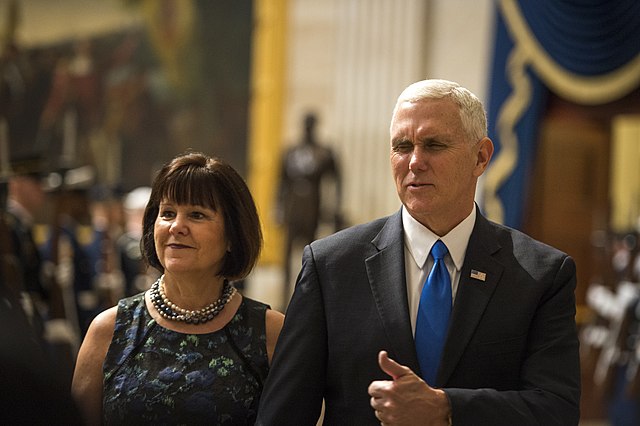
First, there was the Billy Graham Rule, taken from the famous evangelist’s guideline of never being alone with a woman other than his wife.
Then came the Mike Pence Rule: The vice president won’t dine alone with a woman and won’t attend any event where alcohol is served without his wife.
In the wake of many high-profile cases of sexual harassment and worse in the workplace, the appeal to avoid any sense of impropriety is increasing among many men, not just evangelicals.
But the practice may come at a particularly high price for evangelical working women who are excluded from male-dominated social networks that are critical to professional success, according to a study of 178 full-time faculty at an evangelical university.
In the overall survey, men were twice as likely as women to report they feel well-informed when it comes to negotiating for salary and other resources.
And in in-depth interviews with 21 women faculty, exclusion from male social networks at work was tied with an unequal distribution of resources as the problems most mentioned regarding their professional life.
Biola University sociologists Brad Christerson and Eundria Hill-Joseph reported the findings at the recent joint annual meeting of the Society for the Scientific Study of Religion and the Religious Research Association.
Guess who’s not coming to lunch
The research revealed a wide gulf in attitudes. Male faculty expressed fears that gender relations at work may be misinterpreted; female faculty said the inability to interact with male colleagues leaves them out of the loop.
What makes the issue more complex than similar concerns roiling the secular workplace is the faith dimension.
“That whole thing just terrifies me, absolutely terrifies me … If I can avoid it, I’d prefer to avoid having to work closely with a female colleague,” one male faculty member said in an interview.
Asked to explain his fear, the scholar told researchers, “I don’t trust myself, so my theology of human sinfulness is certainly operative in this fear.”
Another man said, “I was paranoid that any time I was showing interest in somebody, just wanting to have a conversation, if it’s a woman that’s going to be misunderstood as I’m hitting on you. It just makes me shut down.”
On the other side of the gender divide, many women faculty indicated they are paying a high price for the insecurities of their male colleagues.
“I’ve had older colleagues kind of speculate in meetings like whether they could even teach a class with me that involved travel like could they travel on a plane and I’m like ‘you don’t think you could sit next to me on a plane?’ What are you afraid of?” one woman said.
Another woman scholar said it felt like each time she thought she connected on a research or intellectual level with a male colleague, “I would immediately get this kind of like … well, we should meet with my wife, or your husband .. or some kind of wall would come up… and I didn’t understand. Like .. do you think I’m attracted to you? I don’t understand.”
Stained-glass partition
The different attitudes on gender interactions are having an impact, the study indicated.
Among the faculty survey findings:
• Four in five male faculty respondents said they hear about opportunities through informal contact with colleagues; just 57 percent of female faculty respondents said they were well-informed
• Three-fifths of male faculty said they feel well-informed when it comes to negotiating for salary and other resources; less than 30 percent of female faculty felt similarly in the know.
• Eighty-five percent of men feel well-informed about expectation for academic advancement; just 63 percent of women said they had the same background.
The study did not establish a causal link, but researchers said the results pointed to evidence of a stained-glass partition, which is magnified in conservative religious organizations and can lead to greater inequalities.
They also noted it may be evidence of a “religiously charged sexism,” where gender conflicts get framed in moral terms such as protecting God’s institution of marriage rather than pragmatic terms such as addressing concerns about harassment accusations.
The latter raises the stakes considerably and makes compromise difficult, the researchers said.
One female faculty member interviewed said that when she raised the issue of women being excluded, “the way it was addressed, was that it’s really a struggle for men, because men they have to watch their sexual drive. There was no acknowledgement of the fact that you trying to manage your urges ends up meaning that I can’t have access to the conversations, and decisions, does that not occur to you?
From her perspective, she noted, “That status quo doesn’t have the hope of changing unless you learn another way to deal with your urges. Why is that my problem?”
Research in the field suggests organizations may address some of these issues with educational seminars on topics such as what does and does not constitute harassment and explaining the costs of excluding individuals from informal social networks.
They could also consider policies mandating senior officials give equal mentoring opportunities to more junior members.
One other step may be to encourage men and women in work relationships to follow an approach that can be challenging even in their personal lives:
Talking openly and honestly to one another.
Image by Staff Sgt. Marianique Santos, via Wikimedia Commons [Public Domain]
The post How the Mike Pence Rule challenges women in evangelical workplace appeared first on Ahead of the Trend.



















